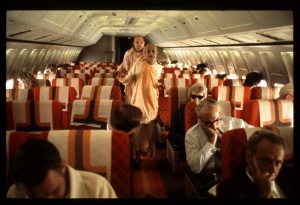SB 10.5.13: Difference between revisions
m (1 revision(s)) |
(Vanibot #0054 edit - transform synonyms into clickable links, which search similar occurrences) |
||
| (One intermediate revision by one other user not shown) | |||
| Line 1: | Line 1: | ||
{{info | {{info | ||
|speaker= | |speaker=Śukadeva Gosvāmī | ||
|listener=King | |listener=King Parīkṣit | ||
}} | }} | ||
[[Category:Srimad-Bhagavatam - Canto 10 Chapter 05]] | |||
[[Category:Bhagavatam Verses Spoken by Sukadeva Gosvami - Vanisource|100513]] | |||
<div style="float:left">'''[[Srimad-Bhagavatam]] - [[SB 10|Tenth Canto]] - [[SB 10.5: The Meeting of Nanda Maharaja and Vasudeva|Chapter 5: The Meeting of Nanda Mahārāja and Vasudeva]]'''</div> | |||
<div style="float:right">[[File:Go-previous.png|link=SB 10.5.12]] '''[[SB 10.5.12]] - [[SB 10.5.14]]''' [[File:Go-next.png|link=SB 10.5.14]]</div> | |||
{{RandomImage}} | |||
==== TEXT 13 ==== | ==== TEXT 13 ==== | ||
<div | <div class="verse"> | ||
avādyanta vicitrāṇi | :avādyanta vicitrāṇi | ||
vāditrāṇi mahotsave | :vāditrāṇi mahotsave | ||
kṛṣṇe viśveśvare 'nante | :kṛṣṇe viśveśvare 'nante | ||
nandasya vrajam āgate | :nandasya vrajam āgate | ||
</div> | </div> | ||
| Line 17: | Line 22: | ||
==== SYNONYMS ==== | ==== SYNONYMS ==== | ||
<div | <div class="synonyms"> | ||
''[//vanipedia.org/wiki/Special:VaniSearch?s=avādyanta&tab=syno_o&ds=1 avādyanta]'' — vibrated in celebration of Vasudeva's son; ''[//vanipedia.org/wiki/Special:VaniSearch?s=vicitrāṇi&tab=syno_o&ds=1 vicitrāṇi]'' — various; ''[//vanipedia.org/wiki/Special:VaniSearch?s=vāditrāṇi&tab=syno_o&ds=1 vāditrāṇi]'' — musical instruments; ''[//vanipedia.org/wiki/Special:VaniSearch?s=mahā&tab=syno_o&ds=1 mahā]-[//vanipedia.org/wiki/Special:VaniSearch?s=utsave&tab=syno_o&ds=1 utsave]'' — in the great festival; ''[//vanipedia.org/wiki/Special:VaniSearch?s=kṛṣṇe&tab=syno_o&ds=1 kṛṣṇe]'' — when Lord Kṛṣṇa; ''[//vanipedia.org/wiki/Special:VaniSearch?s=viśva&tab=syno_o&ds=1 viśva]-[//vanipedia.org/wiki/Special:VaniSearch?s=īśvare&tab=syno_o&ds=1 īśvare]'' — the master of the entire cosmic manifestation; ''[//vanipedia.org/wiki/Special:VaniSearch?s=anante&tab=syno_o&ds=1 anante]'' — unlimitedly; ''[//vanipedia.org/wiki/Special:VaniSearch?s=nandasya&tab=syno_o&ds=1 nandasya]'' — of Mahārāja Nanda; ''[//vanipedia.org/wiki/Special:VaniSearch?s=vrajam&tab=syno_o&ds=1 vrajam]'' — at the pasturing place; ''[//vanipedia.org/wiki/Special:VaniSearch?s=āgate&tab=syno_o&ds=1 āgate]'' — had so arrived. | |||
</div> | </div> | ||
| Line 24: | Line 29: | ||
==== TRANSLATION ==== | ==== TRANSLATION ==== | ||
<div | <div class="translation"> | ||
Now that the all-pervading, unlimited Lord Kṛṣṇa, the master of the cosmic manifestation, had arrived within the estate of Mahārāja Nanda, various types of musical instruments resounded to celebrate the great festival. | Now that the all-pervading, unlimited Lord Kṛṣṇa, the master of the cosmic manifestation, had arrived within the estate of Mahārāja Nanda, various types of musical instruments resounded to celebrate the great festival. | ||
</div> | </div> | ||
| Line 31: | Line 36: | ||
==== PURPORT ==== | ==== PURPORT ==== | ||
<div | <div class="purport"> | ||
The Lord says in Bhagavad-gītā ([[BG 4.7]]): | The Lord says in [[Bhagavad-gita As It Is (1972)|''Bhagavad-gītā'']] ([[BG 4.7 (1972)|BG 4.7]]): | ||
:yadā yadā hi dharmasya | :''yadā yadā hi dharmasya'' | ||
:glānir bhavati bhārata | :''glānir bhavati bhārata'' | ||
:abhyutthānam adharmasya | :''abhyutthānam adharmasya'' | ||
:tadātmānaṁ sṛjāmy aham | :''tadātmānaṁ sṛjāmy aham'' | ||
"Whenever and wherever there is a decline in religious practice, O descendant of Bharata, and a predominant rise of irreligion—at that time I descend Myself." Whenever Kṛṣṇa comes, once in a day of Brahmā, He comes to the house of Nanda Mahārāja in Vṛndāvana. Kṛṣṇa is the master of all creation (sarva-loka-maheśvaram ([[BG 5.29]])). Therefore, not only in the neighborhood of Nanda Mahārāja's estate, but all over the universe—and in all the other universes—musical sounds celebrated the auspicious arrival of the Lord. | "Whenever and wherever there is a decline in religious practice, O descendant of Bharata, and a predominant rise of irreligion—at that time I descend Myself." Whenever Kṛṣṇa comes, once in a day of Brahmā, He comes to the house of Nanda Mahārāja in Vṛndāvana. Kṛṣṇa is the master of all creation (''sarva-loka-maheśvaram'' ([[BG 5.29 (1972)|BG 5.29]])). Therefore, not only in the neighborhood of Nanda Mahārāja's estate, but all over the universe—and in all the other universes—musical sounds celebrated the auspicious arrival of the Lord. | ||
</div> | </div> | ||
__NOTOC__ | |||
<div style="float:right; clear:both;">[[File:Go-previous.png|link=SB 10.5.12]] '''[[SB 10.5.12]] - [[SB 10.5.14]]''' [[File:Go-next.png|link=SB 10.5.14]]</div> | |||
__NOTOC__ | |||
__NOEDITSECTION__ | |||
Latest revision as of 19:19, 17 February 2024

A.C. Bhaktivedanta Swami Prabhupada
TEXT 13
- avādyanta vicitrāṇi
- vāditrāṇi mahotsave
- kṛṣṇe viśveśvare 'nante
- nandasya vrajam āgate
SYNONYMS
avādyanta — vibrated in celebration of Vasudeva's son; vicitrāṇi — various; vāditrāṇi — musical instruments; mahā-utsave — in the great festival; kṛṣṇe — when Lord Kṛṣṇa; viśva-īśvare — the master of the entire cosmic manifestation; anante — unlimitedly; nandasya — of Mahārāja Nanda; vrajam — at the pasturing place; āgate — had so arrived.
TRANSLATION
Now that the all-pervading, unlimited Lord Kṛṣṇa, the master of the cosmic manifestation, had arrived within the estate of Mahārāja Nanda, various types of musical instruments resounded to celebrate the great festival.
PURPORT
The Lord says in Bhagavad-gītā (BG 4.7):
- yadā yadā hi dharmasya
- glānir bhavati bhārata
- abhyutthānam adharmasya
- tadātmānaṁ sṛjāmy aham
"Whenever and wherever there is a decline in religious practice, O descendant of Bharata, and a predominant rise of irreligion—at that time I descend Myself." Whenever Kṛṣṇa comes, once in a day of Brahmā, He comes to the house of Nanda Mahārāja in Vṛndāvana. Kṛṣṇa is the master of all creation (sarva-loka-maheśvaram (BG 5.29)). Therefore, not only in the neighborhood of Nanda Mahārāja's estate, but all over the universe—and in all the other universes—musical sounds celebrated the auspicious arrival of the Lord.